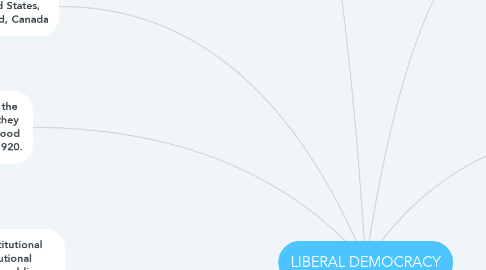LIBERAL DEMOCRACY
by Hershie Tibayan

1. Political Thoughts
1.1. Defend and increase civil liberties against the encroachment of governments, institutions and powerful forces in society
1.2. Restrict or regulate government intervention in political, economic and moral matters affecting the citizenry
1.3. Increase the scope for religious, political and intellectual freedom of citizens
1.4. Question the demands made by vested interest groups seeking special privileges
1.5. Develop a society open to talent and which rewards citizens on merit, rather than on rank, privilege or status.
1.6. Frame rules that maximize the well-being of all or most citizens
2. Democracy is the theory that the common people know what they want, and deserve to get it good and hard.” – H.L. Mencken, 1920.
3. political systems, such as Australia, the United States, Britain, New Zealand, Canada
4. It takes various constitutional forms such as constitutional republic, or federal republic, or constitutional monarchy, or presidential system, or parliamentary system, or a hybrid semi-presidential system.
4.1. United States, India, Germany or Brazil takes the form of a constitutional republic or sometimes the form of a federal republic.
4.2. United Kingdom, Japan, Canada or Spain take the form of a constitutional monarchy
5. Core Assertion
6. Principles
6.1. A belief in the individual, based on the idea that the individual is both moral and rational.
6.2. A belief in REASON and PROGRESS, based on the belief that growth and development are the natural conditions of mankind, with politics the art of compromise,
6.3. A consensual theory of society, based on the belief that society is a kind of mutual benefit association, based on the desire for order and co-operation, rather than disorder and conflict.
6.4. A suspicion of concentrated forms of power, whether by individuals, groups or government.
7. Economic Features
7.1. Increases general prosperity
7.2. reduces poverty
7.3. causes democratization
7.4. Higher human capital accumulation
7.5. Lower inflation
7.6. Lower political instability
7.7. Higher economic freedom
8. Weaknesses
8.1. do not exercise their right to vote
8.2. mobs can influence people
8.3. wastage of money and resources
8.4. involve immoral practices to lure the masses
8.5. engage in corrupt practices
9. Strenghts
9.1. provide for changes in government without violence.
9.2. prevents monopoly of the ruling authority
9.3. obligation towards the citizens
9.4. people gain a sense of participation
9.5. promotes equality and the protection of people's rights
9.6. brings transparency and fairness
9.7. people are directly responsible for the policies
9.8. cater to the people's interests
9.9. equipped with the time and resources to handle the demands of the citizens
9.10. better distribution of power and work


